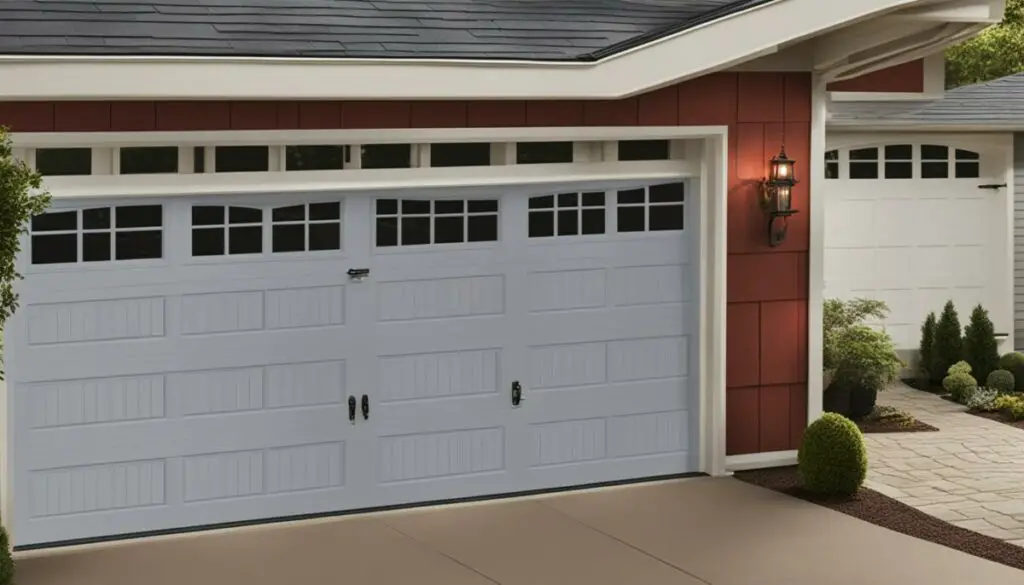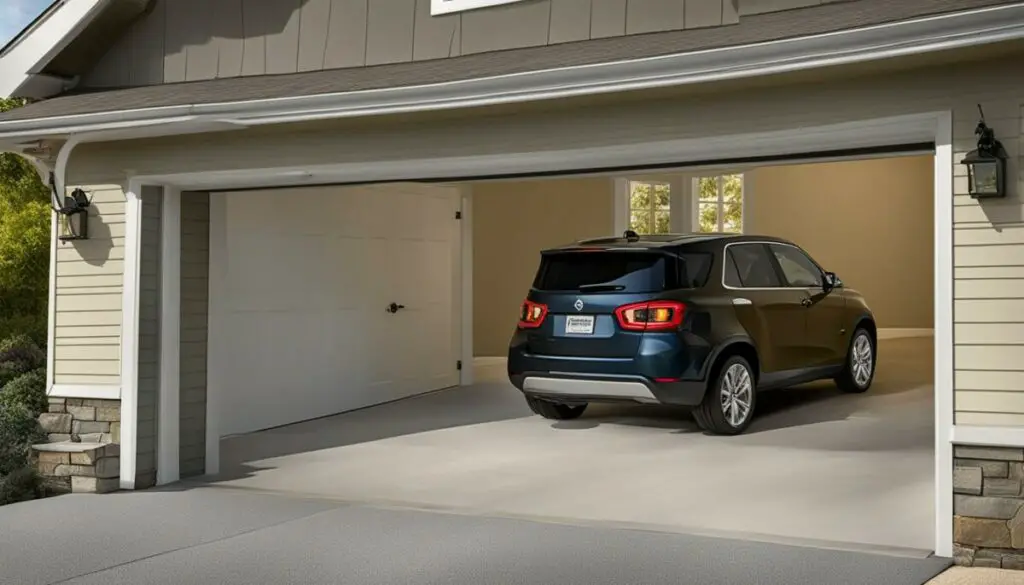Last Updated on 5 months by Francis
Garage door openers have revolutionized the way we access our garages, providing convenience and security. But how do they work? Are garage door openers infrared? In this article, we will explore the fascinating world of garage door openers and uncover the role of infrared technology in their operation.
When it comes to safety, garage door openers have got you covered. They come equipped with infrared safety eye protection systems that use specialized filters for accurate readings. These safety eyes, mounted on each side of the door, can detect when a person is in the path of the garage door, ensuring their safety.
Not only do garage door openers prioritize safety, but they also have force settings to prevent the door from closing on anything it encounters. These force settings can be adjusted to ensure proper operation and prevent accidents. Additionally, maintaining the balance of the garage door is crucial to prevent strain on the opener and ensure smooth operation.
Now that we’ve covered the basics, let’s dive deeper into the history, types, installation, and maintenance of garage door openers to help you make an informed decision for your home.
Contents
Key Takeaways:
- Garage door openers use infrared technology for safety and detection purposes.
- Regular maintenance and proper installation are essential for optimal performance.
- There are different types of garage door openers to suit various needs and budgets.
- Consider factors such as door size, material, horsepower rating, and safety features when choosing a garage door opener.
- Additional features such as internet connectivity and battery backup enhance the functionality of garage door openers.
The History of Garage Door Openers

The invention of garage door openers revolutionized the way we access and secure our garages. The history of garage door openers dates back to 1926 when C.G. Johnson invented the first electronic garage door opener. However, it wasn’t until the 1970s that these openers gained popularity and became a standard feature in residential homes.
Alliance Manufacturing Co., now known as Genie Co., played a significant role in the advancement of garage door openers. In 1954, they introduced a remote radio control transmitter, which paved the way for residential home automation. This breakthrough allowed homeowners to conveniently operate their garage doors without leaving their vehicles.
In the 1980s, engineers focused on improving the safety features of garage door openers to prevent injuries. This led to the development of infrared sensors that can detect objects in the path of the garage door. These sensors revolutionized the safety standards of garage door openers by providing an extra layer of protection.
“The invention of garage door openers has greatly improved the convenience and safety of accessing our garages.”
– Garage Door Expert
Today, garage door openers have become an integral part of residential homes in the United States. They have evolved to include various features such as rolling code security technology, smart home connections, and battery backup options. The history of garage door openers showcases the continuous innovation and commitment to providing homeowners with secure and convenient access to their garages.
| Year | Significant Milestone |
|---|---|
| 1926 | Invention of the first electronic garage door opener by C.G. Johnson |
| 1954 | Alliance Manufacturing Co. introduces remote radio control transmitter |
| 1980s | Development of infrared sensors for enhanced safety |
The history of garage door openers is a testament to the continuous efforts to improve the convenience and safety of accessing our garages. As technology advances, we can expect further innovations in garage door opener designs and features.
How Do Garage Door Openers Work?

Garage door openers are a convenient and essential part of modern homes, providing ease of use and enhanced security. But have you ever wondered how these devices actually work? In this section, we will explore the inner workings of garage door openers, specifically focusing on infrared technology and sensors.
When you press the remote or wall switch to open or close your garage door, a signal is sent to the garage door opener’s motor. The motor then activates and starts the process of moving the door. Depending on the type of opener, the motor is connected to a chain, belt, or screw mechanism, which is responsible for moving the door along a track.
One of the key safety features of garage door openers is the infrared sensor system. These sensors are positioned on each side of the garage door and emit infrared beams. When an object, such as a person or vehicle, interrupts the infrared beam while the door is closing, the sensors detect the obstruction and send a signal to the opener to reverse the door’s movement, preventing accidents and injuries. This technology ensures that the door will not close on anything in its path.
In addition to the infrared sensors, garage door openers also consist of other components such as springs, gears, and a control panel. These components work together to ensure the smooth and efficient operation of the garage door. Regular maintenance and inspections are crucial to keep the opener in optimal condition and prevent any potential malfunctions.
In summary, garage door openers operate by receiving signals from a remote or wall switch to activate the motor, which moves the door using a chain, belt, or screw mechanism. Infrared sensors play a vital role in detecting objects in the path of the door and ensuring safety. Understanding how garage door openers work can help homeowners make informed decisions when choosing the right opener for their needs.
Different Types of Garage Door Openers

When it comes to garage door openers, there are several types available, each with its own advantages and considerations. Understanding the different types can help you make an informed decision when selecting the right opener for your garage door.
Chain Drive Openers
Chain drive openers are the most common and affordable type of garage door opener. They use a chain to move the garage door along a track. While they are durable and reliable, they can be noisy during operation.
Belt Drive Openers
Belt drive openers use a rubber belt instead of a chain, making them quieter than chain drive openers. They are a popular choice for those who want a quieter garage door opening experience, although they may be slightly more expensive.
Screw Drive Openers
Screw drive openers use a threaded rod to move the garage door. They are known for their simplicity and require less maintenance compared to chain or belt drive openers. However, they may not be suitable for areas with extreme temperature fluctuations.
Jackshaft Openers
Jackshaft openers are mounted on the wall beside the garage door, rather than on the ceiling. They are ideal for garages with limited ceiling space and can also be used to maximize overhead storage. These openers are often favored for their space-saving design.
Direct-Drive Openers
Direct-drive openers have the motor integrated into the trolley, eliminating the need for a separate chain, belt, or screw. This design makes them low maintenance and ensures smooth and quiet operation. They are also known for their long-lasting performance.
Hoist Openers
Hoist openers are designed for heavier and larger doors, such as those found in commercial settings. They utilize a system of pulleys and counterweights to lift and lower the door. These openers provide the necessary power for handling heavy doors with ease.
Each type of garage door opener has its own unique features and considerations. It’s important to consider factors such as noise level, durability, maintenance requirements, and suitability for the size and weight of your garage door when choosing the right opener for your needs.
Factors to Consider When Choosing a Garage Door Opener

Choosing the right garage door opener for your home is an important decision that requires careful consideration. Several factors should be taken into account to ensure that you select the best option for your specific needs and preferences.
Size and Weight of the Garage Door
First and foremost, it’s essential to consider the size and weight of your garage door. Different openers are designed to handle specific door sizes and weights. You need to ensure that the opener you choose is compatible with your garage door to ensure optimal performance and longevity.
Type of Material Used for the Door
The material of your garage door can also impact the type of opener you should choose. Some materials, such as heavy wood or solid steel, may require more powerful openers to handle the weight. On the other hand, lightweight aluminum or fiberglass doors may require less powerful openers. Consider the material of your garage door when making your selection.
Horsepower Rating of the Opener
The horsepower rating of the garage door opener is another important consideration. The horsepower rating determines the strength and speed at which the opener can lift and lower the door. Smaller doors may only require a lower horsepower rating, while larger and heavier doors may necessitate a higher rating. Make sure to choose an opener with the appropriate horsepower for your door.
Type of Power Used
Garage door openers can operate on either Alternating Current (AC) or Direct Current (DC) power. AC-powered openers are more common and suitable for most residential applications. However, DC-powered openers offer certain advantages such as quieter operation and backup power options. Consider your power requirements and preferences when selecting an opener.
Noise Level
The noise level of the opener is an important factor, especially if you have living spaces above or adjacent to your garage. Some openers, such as belt drive or direct-drive models, are known for their quiet operation. If noise is a concern for you, consider choosing an opener that offers a quieter performance.
Safety Features
Lastly, consider the safety features offered by the garage door opener. Look for features such as infrared sensors that detect objects in the path of the door, automatic reverse mechanism when an obstruction is detected, and rolling code technology for added security. Ensure that the opener you choose provides the necessary safety features to protect you and your loved ones.
By considering these factors and evaluating your specific needs, you can make an informed decision when choosing a garage door opener. Remember to consult with professionals if you have any questions or require assistance in selecting the right opener for your garage.
Advantages and Disadvantages of Garage Door Openers

Garage door openers offer numerous benefits, making them a popular choice for homeowners. One of the key advantages of infrared garage door openers is the enhanced safety they provide. With the use of infrared sensors, these openers can detect objects or people in the path of the garage door, preventing accidents and injuries. This safety feature is particularly important when there are children or pets around.
Convenience is another significant advantage of garage door openers. Instead of manually opening and closing the door, you can simply press a button on a remote or a wall switch to operate the door. This is especially convenient when you are inside your car or carrying heavy items. Additionally, garage door openers offer different speed options, allowing you to adjust the speed according to your preferences.
“Garage door openers eliminate the need for manual operation, providing convenience, safety, and security to homeowners.”
Garage door openers also provide increased security for your home. Many models come equipped with rolling code security technology, which generates a unique code each time the door is operated. This prevents unauthorized access to your garage, offering peace of mind. Some openers also offer internet connectivity, allowing you to monitor and control your garage door remotely through a mobile app.
Despite these advantages, there are a few disadvantages to consider. Garage door openers require regular maintenance to ensure optimal performance. Lubricating moving parts, checking and adjusting force settings, and testing safety sensors are some of the maintenance tasks that need to be performed. Additionally, garage door openers must be installed by professionals to ensure proper functionality.
Furthermore, garage door openers rely on power to operate, which means they may not function during power outages unless they have a battery backup. This reliance on power is an important factor to consider, especially in areas prone to frequent power disruptions.
Overall, the benefits of infrared garage door openers outweigh the disadvantages for most homeowners. They provide convenience, safety, and security, making them a valuable addition to any home.
| Advantages | Disadvantages |
|---|---|
| Enhanced safety with infrared sensors | Regular maintenance required |
| Convenience of remote operation | Professional installation needed |
| Various speed options | Reliance on power |
| Increased security with rolling code technology |
Additional Features for Garage Door Openers
Garage door openers have evolved over the years to offer more than just basic functionality. Many models now come with a range of additional features that enhance convenience, safety, and security. Here are some of the notable features you can find in modern garage door openers:
- Door Reversal: Some garage door openers are equipped with a door reversal feature that automatically stops and reverses the door if it encounters an obstacle during closing. This provides an extra layer of safety and prevents accidents.
- Internet Connectivity: With the advancement of technology, many garage door openers now offer internet connectivity. This allows you to control and monitor your garage door remotely through a smartphone app or compatible home automation system.
- Entrapment Sensors: Entrapment sensors are designed to detect any obstructions or resistance while the door is in motion. If an object or person is detected, the sensors will immediately stop the door’s movement to prevent any accidents or injuries.
- Battery Backup: In case of a power outage, a garage door opener with a battery backup ensures that you can still operate your garage door. This feature provides peace of mind and allows you to access your garage even during emergencies.
In addition to these features, there are other options such as smart home connections, rolling code security technology, touchpads or keypads for remote entry, and overhead lights. These features add convenience and functionality to the garage door opener, making your daily life easier.
When choosing a garage door opener, consider the additional features that align with your needs and preferences. Keep in mind that not all brands offer the same features, so it’s important to research and compare different models to find the one that suits your requirements.
Installation and Maintenance of Garage Door Openers
Proper installation and regular maintenance are crucial for the optimal performance and longevity of your garage door opener. While some homeowners may attempt the installation themselves, it is highly recommended to leave this task to professionals who have the expertise and knowledge to ensure a safe and effective installation.
During the installation process, the professionals will carefully follow the manufacturer’s instructions, ensuring that all components are correctly assembled and securely attached. They will also properly adjust the force settings to ensure the door operates smoothly without causing any damage or safety hazards.
Once the installation is complete, regular maintenance is essential to keep your garage door opener in good working condition. This includes lubricating the moving parts, such as the chains or belts, to reduce friction and prolong their lifespan. It is also important to regularly test and inspect the safety features of the opener, such as the infrared sensors, to ensure they are functioning correctly. Additionally, professionals can inspect the overall performance of the opener and make any necessary adjustments or repairs.
By investing in professional installation and regular maintenance, you can have peace of mind knowing that your garage door opener is operating safely and efficiently, providing you with convenient access to your garage while ensuring the security of your home.
Conclusion
Garage door openers have revolutionized modern homes, providing convenience, safety, and security. With the advent of infrared technology, these openers can detect objects in the path of the door, preventing accidents and ensuring the well-being of individuals. Whether you have a small or large garage door, there are various types of openers available to suit your specific needs.
Proper installation and regular maintenance are key to the optimal performance and longevity of your garage door opener. It is crucial to have professionals handle the installation process to ensure proper functionality. Additionally, regular maintenance tasks, such as lubricating moving parts and testing safety sensors, should be performed to keep your opener in top shape.
By choosing a garage door opener that aligns with the size and material of your door, as well as your budget, you can experience the convenience and security that these systems offer. Whether you opt for a chain drive, belt drive, or screw drive opener, you can enjoy the benefits of automatic operation, enhanced safety features, and increased peace of mind.
FAQ
Are garage door openers infrared?
Yes, garage door openers often come with infrared safety eye protection systems that use specialized filters for accurate readings.
What is the history of garage door openers?
Garage door openers were invented in 1926 by C.G. Johnson, but they didn’t become popular until the 1970s. In the 1980s, engineers developed infrared sensors for safety.
How do garage door openers work?
Garage door openers receive a signal from a remote or wall switch, activating the motor and using a chain, belt, or screw mechanism to move the door. Infrared sensors detect objects and reverse the door’s movement.
What are the different types of garage door openers?
There are chain drive, belt drive, screw drive, jackshaft, direct-drive, and hoist openers available, each with their own advantages and considerations.
What factors should be considered when choosing a garage door opener?
Size and weight of the door, material, horsepower rating, power type, noise level, and safety features are important considerations when selecting a garage door opener.
What are the advantages and disadvantages of garage door openers?
Garage door openers offer safety, convenience, various designs, speed options, and increased security. However, they require maintenance, professional installation, and reliance on power.
What additional features can garage door openers have?
Garage door openers can have features such as door reversal, internet connectivity, entrapment sensors, battery backup, smart home connections, rolling code security technology, touchpads, or overhead lights.
How should garage door openers be installed and maintained?
Garage door openers should be installed by professionals, and regular maintenance tasks include lubricating parts, adjusting force settings, testing safety sensors, and inspecting overall performance.
What is the conclusion about garage door openers?
Garage door openers are an essential component of modern homes, providing convenience, safety, and security with their infrared technology and various types and features.








